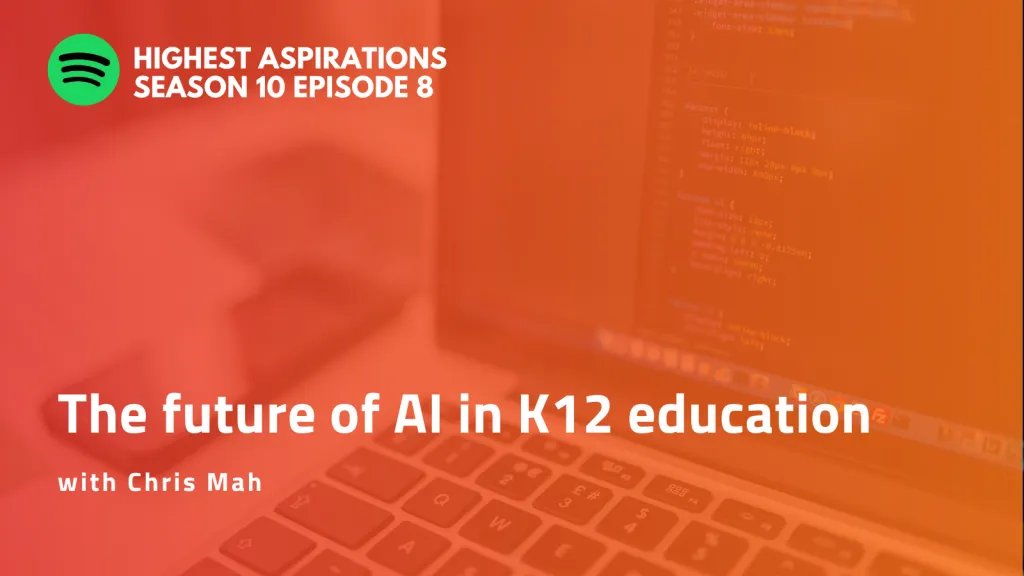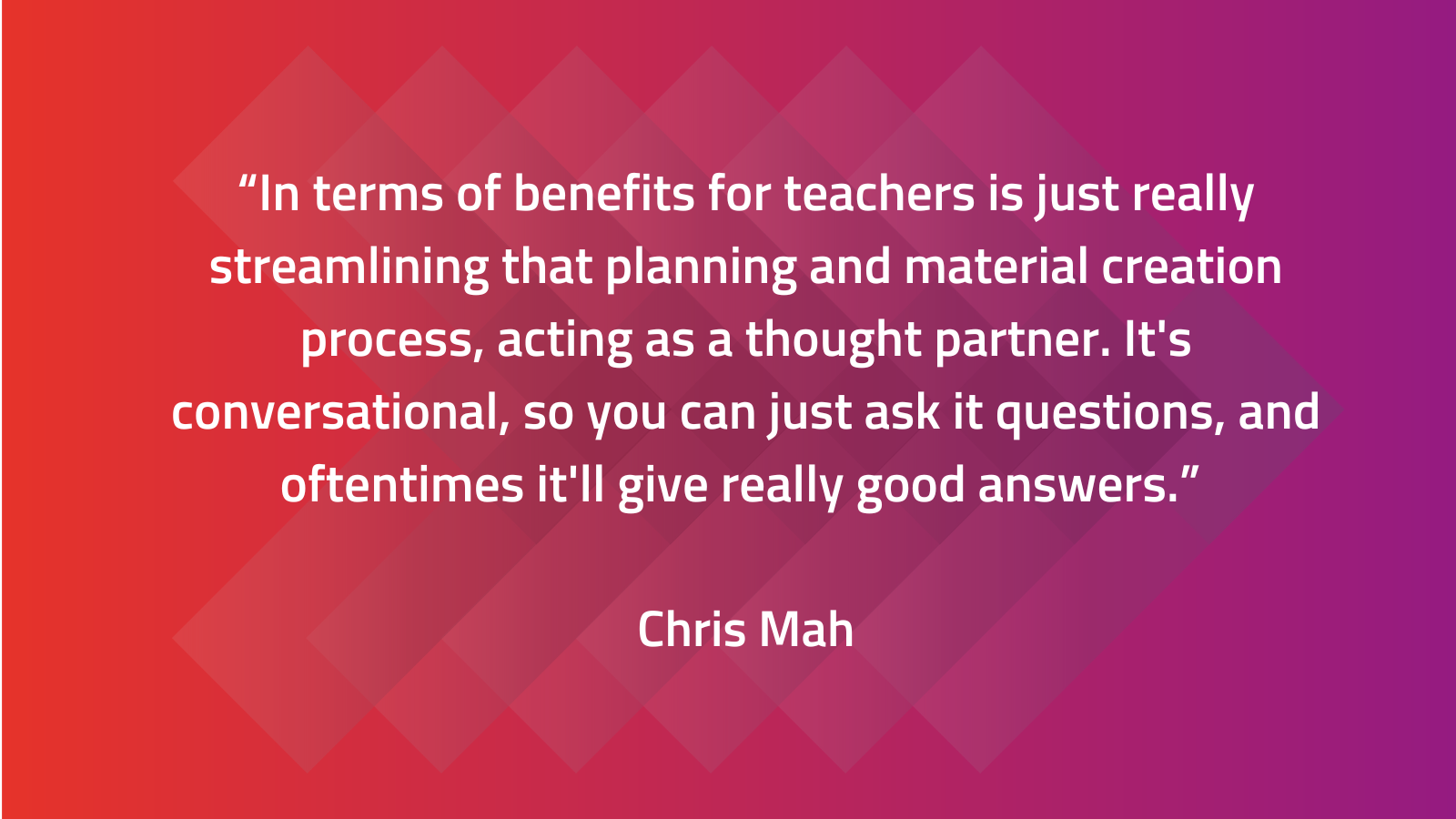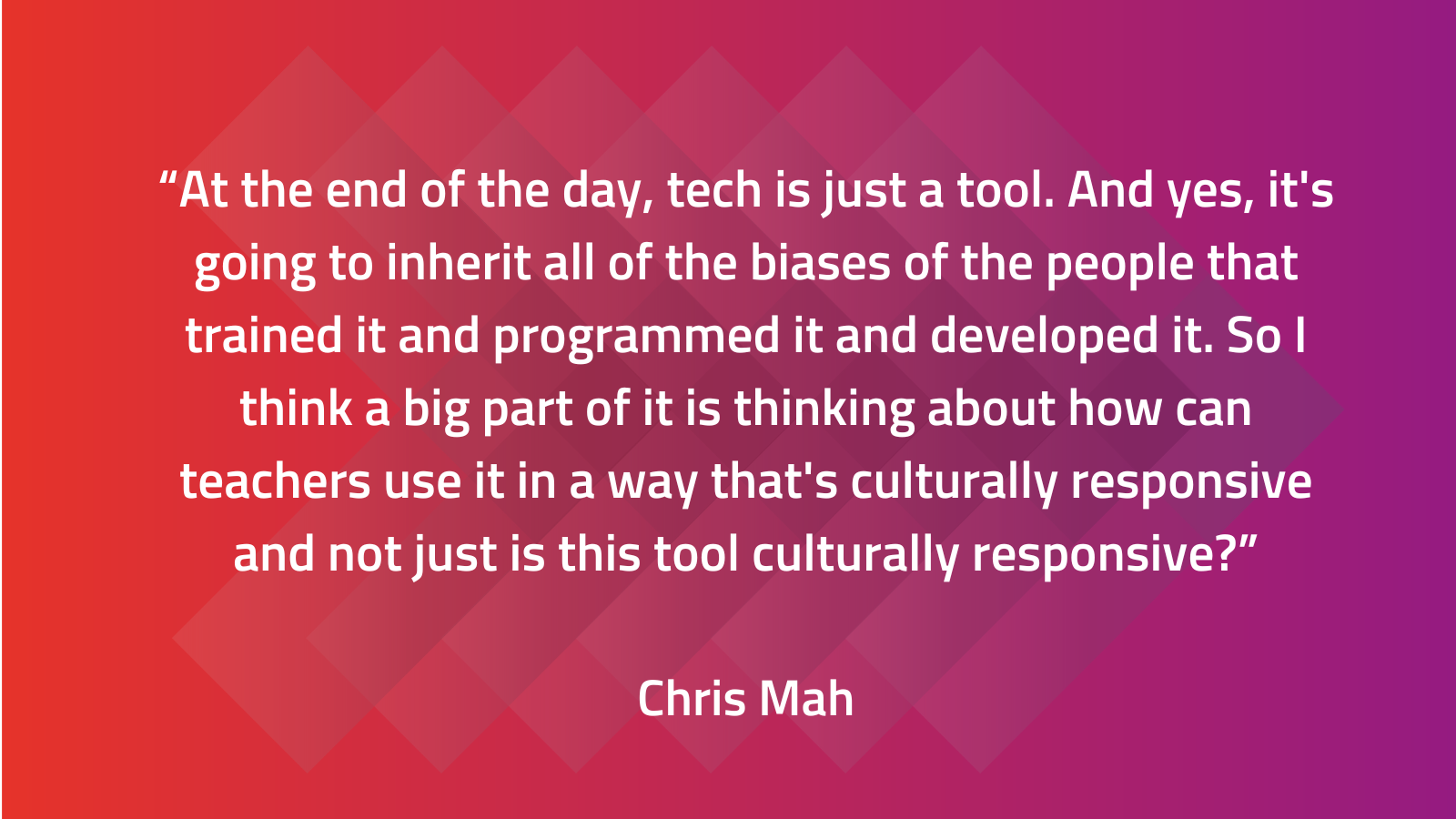The future of AI in K12 education


The future of AI in K12 education
Artificial Intelligence (AI) such as ChatGPT has the potential to revolutionize the way K12 education is delivered, particularly for English learners. But many feel uncertain about the best ways to harness the technology and have concerns about unknown effects on students as well as its impact on the future of teaching.
We explore the future of AI in K12 education and how it can change the way we teach and learn with high school English teacher and Stanford doctoral student in literacy research Chris Mah. Listen to the full episode here, or read the highlights from the conversation below.
How AI impacts the experience of EL students
Mah outlines a number of positive ways the technology may improve learning for students:
“One of the big benefits is that it's going to change what's necessary for kids to know and do in order to be successful…A lot of our traditional schooling is built on outdated models. And I think that having a tool that can solve all these different problems through language really forces us to ask these questions around what are we teaching and why, that are super overdue and super necessary.”
In addition to changing what students are expected to learn, it may also shift how.
“It really makes us think about moving away from these superficial forms of writing and assessment that we prioritize in high school, and more towards more meaningful forms of writing, expressive writing, critical writing, personal writing. And then really importantly, the one that I care a lot about is writing to think and learn, writing, not just a way of demonstrating what you know, but it's actually a way of learning. And I really think that this new technology gives us an opportunity to have some of those difficult conversations.”
However, Mah shares that despite these potential benefits, he isn’t advocating having direct student usage of the technology at this stage.
“I am still hesitant about putting this tool in front of students. As powerful as it is, this is the worst the technology will probably ever be, which is a scary thing. And so right now, the tool's still a little unpredictable. It takes a lot of sophistication to write the prompts in the way that gets you the best output….But eventually, this type of technology is going to allow every student to have a "skilled" one-on-one tutor.”
Mah also provides examples of how AI can impact the learning experience for specifically MLLs.
“So I think there's a couple buckets for ELs in particular. One is differentiation. So a lot of teachers already have caught onto this idea that you can take any text and you can basically treat it like Newsela. You can say, here's a New York Times article on voting rights. It's 1400 Lexile, please rewrite this for me at an 800 Lexile, or add a 1500 Lexile for that matter….Being able to say, Hey, translate this to Spanish or translate this to Chinese is also a game changer.”
The translation features of AI have important benefits for multilingual learners beyond the ease or convenience of getting them materials in their first language.
“For a lot of our EL students, in particular, we want to be encouraging them to continue learning in all of their languages because a lot of what we interpret as reading comprehension is actually background knowledge….There is empirical evidence that background knowledge actually contributes a lot to reading comprehension. So if we can translate articles for kids, if we can translate materials for kids and they can continue learning in all of their languages, they're going to get better at English reading comprehension because they have a bigger base of background knowledge. “
How AI impacts the experience of educators
There are a number of benefits that educators may already be experiencing with AI as the technology begins to be used in their work.

Beyond improving existing plans, it can also be used to create learning materials and activities for students with a much smaller strain on teachers’ time and effort.
“Teachers can use these tools to create exemplars for students…you can get it to write five different versions of a paragraph based on a writing prompt. You can change the actual argument it's making each time, change some of the rhetorical strategies it uses. Now students can analyze and evaluate the argument in each of those five. They can sort them from strongest to weakest. They can do all sorts of different things to push their critical thinking with the outputs that ChatGPT has made.”
Perhaps the most important benefit to teachers that Mah covers is the opportunity to relieve them of the more time consuming parts of their roles so they can reallocate that time directly to their students.
“Finally, being able to do the things that we do at a larger scale. This tool has the potential to magnify what we're able to do and allow us to shift our time to things like building student relationships, giving one-on-one feedback.”
Challenges and concerns around increasing presence of AI in the classroom
One major concern around the new technology is the presence of bias in the responses that are generated and the impact that can have on users.

This is an issue that is top of mind for not only those in the field of education but the technology creators as well.
“I do think that the big players that are developing these tools know that it's an issue. There are different models and versions of these tools that are being built on different data sets that attend more or less to issues of bias and discrimination…But at the end of the day, technology is never going to be a hundred percent safe. It's the same for the internet as well. And so really what we should be thinking about is how can we promote greater AI literacy for educators and students so that they can identify these things, prevent the tool from putting out that content.”
The fear on many peoples’ minds with the influx of AI is the taking over of peoples’ jobs by the technology - but Mah doesn’t believe teachers will be affected in this way.
“I don't see the role of a teacher ever being displaced, because we do so much more than just answer questions. I think there are legitimate concerns around automation taking people's jobs. I just don't see that happening with a teacher. I do see the role transforming though. … think in terms of just the role of the teacher, right now, we spend a lot of time doing things that could be done faster, better, and at bigger scale by machines. And if that can happen, that allows teachers to spend more time doing the things that only humans can do, which is very, very connected with the social and the relational forms of learning.”
Download the full episode transcript here.